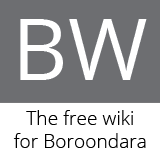Camberwell
More actions
| Camberwell Melbourne, Victoria | |||||||||||||
|---|---|---|---|---|---|---|---|---|---|---|---|---|---|
| Population | 21,965 (2021)[1] | ||||||||||||
| Postcode(s) | 3124 | ||||||||||||
| Area | 5.8 km2 | ||||||||||||
| Location | 10 km from Melbourne | ||||||||||||
| LGA(s) | Boroondara | ||||||||||||
| LGA ward | Junction, Gardiner, Lynden | ||||||||||||
| State electorate(s) | |||||||||||||
| Federal Division(s) | Kooyong | ||||||||||||
| |||||||||||||
Camberwell is a central suburb located in the City of Boroondara. It is the largest suburb in the municipality by area.
History
Pre-European settlement
The area now known as Camberwell was inhabited from an estimated 31,000 to 40,000 years ago and is part of the lands of the Wurundjeri people of the Kulin nation.
Early European settlement
Development of Camberwell was not uniform. Areas close to Camberwell Junction and the railway station were built first. This was due to the land being more desirable and closer to amenities.
The area south of Riversdale Road and east of W Creek was one of the last to be built. As late as the 1910s it was referred to as "No Man's Land" due to its lack of buildings and services. For example, it received no postal service during this time, as both the Burwood and Surrey Hills Post Offices claimed it was outside their jurisdiction.[2]
References
- ↑ Australian Bureau of Statistics. Camberwell (Vic.) 2021 Census All persons QuickStats. 2021. https://www.abs.gov.au/census/find-census-data/quickstats/2021/SAL20453, accessed: 18 February 2025
- ↑ "NO MAN'S LAND.", 17 August 1917, p. 3. Retrieved on 18 February 2025.
